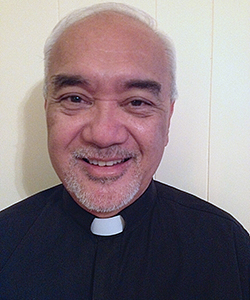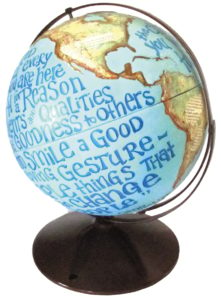God: Present and Acting In Our Lives
The Rev. John A.H. Tomoso †
There is a side or perspective of theology that is public, i.e. out in the community; that is for all to hear. This public theology is about proclaiming the good news to a wide audience of believers and nonbelievers, with the believers not necessarily all Christian. As a priest, I use the Gospel to foster, to nurture spirituality, at whatever level it needs to be recognized and understood, in the lives of those who will listen to me. I find public theology in many areas of our community and it is useful in building community, culture and cultural competencies, social equity, diversity and racial equality. Most importantly, public theology more often than not leads to transformative change in society and transformed lives, in relationships that you and I have formed.
I believe that public theology is for the well-being of all persons and because the environment is an ever-present concern, for the well-being of creation. At the inauguration of our new national, state and county governments, a public theology voice has gained its legitimate purpose, a legitimate “pulpit.” A thriving community such as ours can take its purpose from secular public endeavors, while hearing, contemplating and discerning on divine invitations publicly expressed to a wide and diverse audience. As a priest, I am privileged to be able to bring the resources of spirituality and faith to the public places of Maui. Public theology allows for the nurturance of what is called, “the common good.” In both the halls of faith communities, which are sometimes called churches, and in civic assemblies, which are sometimes called government, the “common good” is hailed as “mission” or “purpose” and “achievement” by folk who ascribe to and believe in the idea that all must be included, with no one excluded in a civic, cultural, social endeavor, and where all must derive a benefit.

At the inauguration of our governments, at all levels, voices, some of whom are clergy, are touting “the common good” as a means to call to mindfulness of where God is present and acting within our lives, under intentions and circumstances that involve people from all walks of life and from all social and economic circumstances. As a priest, it means that I can explicitly use the language of faith, sometimes, AND always to express caring, concern, compassion, understanding, patience and kindness. These are, after all, attributes of the Divine, of God, from which public theology finds its foundation, to firmly lead its way into the public squares, halls, arenas and audiences of our community.
 So, as we inaugurate our governments, as new terms begin, my prayer is that we express and live with care, compassion and concern, understanding, patience and kindness, and aloha. My prayer, through my sense of public theology, is that we all carry these divine attributes into our private lives and out into our public lives. Public theology, expressed consistently with these divine attributes, will yield solutions to many of the social “ills” we see around us, e.g., homelessness, domestic and social violence, poverty, hunger, unemployment, injustices of immigration, economics, housing that is unaffordable, healthcare, aging and care-giving, environmental preservation and sustainability, access to quality education, and more. Join me in expressing public theology, so that we can all take our place and do our part, to meet the ever-changing challenges and needs of our local, state, national and global communities. Public theology is everywhere and can be heard throughout God’s great creation, this earth we call home.
So, as we inaugurate our governments, as new terms begin, my prayer is that we express and live with care, compassion and concern, understanding, patience and kindness, and aloha. My prayer, through my sense of public theology, is that we all carry these divine attributes into our private lives and out into our public lives. Public theology, expressed consistently with these divine attributes, will yield solutions to many of the social “ills” we see around us, e.g., homelessness, domestic and social violence, poverty, hunger, unemployment, injustices of immigration, economics, housing that is unaffordable, healthcare, aging and care-giving, environmental preservation and sustainability, access to quality education, and more. Join me in expressing public theology, so that we can all take our place and do our part, to meet the ever-changing challenges and needs of our local, state, national and global communities. Public theology is everywhere and can be heard throughout God’s great creation, this earth we call home.
